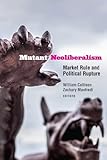Mutant Neoliberalism : Market Rule and Political Rupture / ed. by William Callison, Zachary Manfredi.
Material type: TextPublisher: New York, NY : Fordham University Press, [2019]Copyright date: ©2019Description: 1 online resource (320 p.) : 3Content type:
TextPublisher: New York, NY : Fordham University Press, [2019]Copyright date: ©2019Description: 1 online resource (320 p.) : 3Content type: - 9780823285730
- 320.51/3 23
- JC574 .M88 2020
- online - DeGruyter
| Item type | Current library | Call number | URL | Status | Notes | Barcode | |
|---|---|---|---|---|---|---|---|
 eBook
eBook
|
Biblioteca "Angelicum" Pont. Univ. S.Tommaso d'Aquino Nuvola online | online - DeGruyter (Browse shelf(Opens below)) | Online access | Not for loan (Accesso limitato) | Accesso per gli utenti autorizzati / Access for authorized users | (dgr)9780823285730 |
Frontmatter -- Contents -- Introduction: Theorizing Mutant Neoliberalism -- 1. Neoliberalism's Scorpion Tail -- 2. The Market's People: Milton Friedman and the Making of Neoliberal Populism -- 3. Neoliberals against Europe -- 4. Anti-Austerity on the Far Right -- 5. Disposing of the Discredited: A European Project -- 6. Neoliberalism, Rationality, and the Savage Slot -- 7. Sexing Homo Œconomicus: Finding Masculinity at Work -- 8. Feminist Theory Redux: Neoliberalism's Public-Private Divide -- 9. "Innovation" Discourse and the Neoliberal University: Top Ten Reasons to Abolish Disruptive Innovation -- 10. Absolute Capitalism -- List of Contributors -- Index
restricted access online access with authorization star
http://purl.org/coar/access_right/c_16ec
Tales of neoliberalism's death are serially overstated. Following the financial crisis of 2008, neoliberalism was proclaimed a "zombie," a disgraced ideology that staggered on like an undead monster. After the political ruptures of 2016, commentators were quick to announce "the end" of neoliberalism yet again, pointing to both the global rise of far-right forces and the reinvigoration of democratic socialist politics. But do new political forces sound neoliberalism's death knell or will they instead catalyze new mutations in its dynamic development?Mutant Neoliberalism brings together leading scholars of neoliberalism-political theorists, historians, philosophers, anthropologists and sociologists-to rethink transformations in market rule and their relation to ongoing political ruptures. The chapters show how years of neoliberal governance, policy, and depoliticization created the conditions for thriving reactionary forces, while also reflecting on whether recent trends will challenge, reconfigure, or extend neoliberalism's reach. The contributors reconsider neoliberalism's relationship with its assumed adversaries and map mutations in financialized capitalism and governance across time and space-from Europe and the United States to China and India. Taken together, the volume recasts the stakes of contemporary debate and reorients critique and resistance within a rapidly changing landscape.Contributors: Étienne Balibar, Sören Brandes, Wendy Brown, Melinda Cooper, Julia Elyachar, Michel Feher, Megan Moodie, Christopher Newfield, Dieter Plehwe, Lisa Rofel, Leslie Salzinger, Quinn Slobodian
Mode of access: Internet via World Wide Web.
In English.
Description based on online resource; title from PDF title page (publisher's Web site, viewed 02. Mrz 2022)


